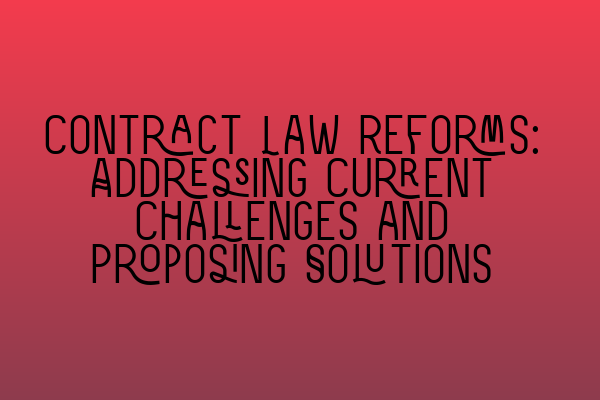**Contract Law Reforms: Addressing Current Challenges and Proposing Solutions**
Introduction:
Contract law is a fundamental area of law that regulates the relationships between parties entering into agreements and ensures the enforcement of promises made. However, as society evolves and new challenges arise, it becomes imperative to consider contract law reforms to address these issues effectively. In this blog post, we will explore some of the current challenges in contract law and propose practical solutions to tackle them.
1. Complexity of Contracts:
Contracts have become increasingly complex over the years, often filled with convoluted legal language and intricate clauses. This complexity not only makes it difficult for parties to understand the terms but also hampers the enforceability of contracts. To address this challenge, contract law reforms should focus on simplifying contract drafting and promoting plain language agreements. By using clear and concise terms, parties can better understand their rights and obligations, reducing the potential for disputes and litigations.
Related Article: SQE 1 Practice Exam Questions
2. Imbalance of Bargaining Power:
In many contractual relationships, one party often possesses significantly more bargaining power than the other, leading to an inherent imbalance. This power imbalance can result in unfair contractual terms and disadvantageous outcomes for the weaker party. To address this issue, contract law reforms should incorporate provisions to promote fairness and equity in contractual agreements. This includes introducing mandatory disclosure requirements, allowing for renegotiation of unfair terms, and even imposing penalties for exploitative contractual practices.
Related Article: SQE 1 Practice Mocks FLK1 FLK2
3. Technological Advancements:
With the rapid advancement of technology, traditional contract law faces new challenges in the digital era. Contracts are now commonly formed electronically, and the use of blockchain technology and smart contracts is gaining popularity. Contract law reforms should adapt to these technological changes by providing a clear legal framework for electronic agreements and recognizing the validity of smart contracts. Additionally, provisions should be introduced to address issues such as data protection, privacy, and cybersecurity concerns in the context of digital contracts.
Related Articles: SQE 2 Preparation Courses, SQE 1 Preparation Courses
4. International Contracts:
In today’s globalized world, international trade and cross-border transactions are becoming increasingly common. However, the enforcement of contracts across different jurisdictions presents challenges due to varying legal systems and conflicting laws. Contract law reforms should aim to harmonize contract laws internationally or establish frameworks that facilitate the recognition and enforcement of foreign judgments. This will provide businesses with a predictable legal environment and promote trust in international trade.
Related Article: SRA SQE Exam Dates
5. Dispute Resolution Mechanisms:
Lastly, contract law reforms should focus on improving dispute resolution mechanisms to provide a more efficient and cost-effective process for resolving contractual disputes. Alternative dispute resolution methods, such as mediation and arbitration, should be further encouraged, reducing the burden on the courts and allowing parties to reach mutually acceptable outcomes. Additionally, the development of specialized courts or tribunals dedicated to contract law disputes can ensure expertise and expedited resolution.
Conclusion:
As contract law continues to play a critical role in facilitating business transactions and protecting the rights of parties, it is essential to address the current challenges and propose practical solutions through contract law reforms. By simplifying contracts, ensuring fairness in bargaining power, adapting to technological advancements, facilitating international contracts, and improving dispute resolution mechanisms, we can strengthen the effectiveness and efficiency of contract law. A modernized and responsive contract law framework will not only protect the interests of parties but also foster trust and confidence in business relationships, driving economic growth.
